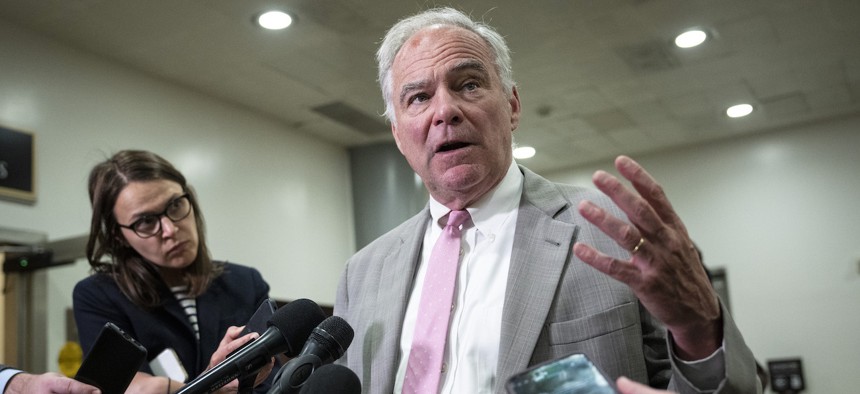Sen. Kaine revives effort to ban Schedule F through the defense policy bill

Sen. Tim Kaine, D-Va., speaks to reporters at the U.S. Capitol on July 11, 2023. Kaine attempted to attach the anti-Schedule F legislation to the National Defense Authorization Act last year, although he ultimately was not able to secure a floor vote on the initiative Drew Angerer/Getty Images
This marks the second straight year that the Virginia Democrat has sought to attach a measure requiring congressional approval for new federal job classifications to the National Defense Authorization Act.
Sen. Tim Kaine, D-Va., on Friday announced that he once again has sought to secure a vote in Congress on proposals to prevent a president from unilaterally stripping the civil service protections of tens of thousands of federal workers by filing an amendment to the annual defense policy bill.
In October 2020, then-President Trump signed an executive order establishing a new job category in the excepted service for federal workers in policy-related positions called Schedule F and tasked agencies with finding career employees to transfer to the new classification, stripping them of the vast majority of their civil service protections and making it much easier to hire and fire them. Although a few agencies had gotten close to implementing the edict, ultimately no employees were reclassified before President Biden took office and quickly rescinded the initiative.
Although the issue has lain dormant since then, last year conservative activists and ex-Trump administration staffers revealed that they have continued to work on Schedule F in an effort to have it ready for the next Republican president to implement shortly after taking office. The plan’s proponents have gone so far as to identify up to 50,000 current federal workers to transfer to the new job category and threaten with termination immediately upon its reinstatement.
Kaine on Friday announced that he filed an amendment to the Senate version fiscal 2024 National Defense Authorization Act that would attach the Saving the Civil Service Act to the annual must-pass bill. The measure bars the president from creating any new job classifications within the excepted service aside from the five that existed in September 2020, effectively requiring the president to seek congressional approval to add new job categories.
Kaine’s bill also would create new restrictions on how federal jobs can be reclassified under the current system, barring the reclassifications of positions currently held by a federal employee out of the competitive service or other excepted service categories into Schedule C, the government’s primary cadre of political appointees, without the approval of the director of the Office of Personnel Management. And agencies would be limited to reclassifying 1% of their workforces or five employees—whichever is more—out of the competitive service or across excepted service categories over the course of a four-year presidential term. Employees proposed for reclassification also would need to consent to the change.
“Our federal workers work tirelessly to deliver results for the American people and keep us safe,” Kaine said in a statement. “My amendment is critical to helping ensure federal workers—including key national security personnel—are hired based on their qualifications, not their politics.”
Kaine attempted to attach the anti-Schedule F legislation to the NDAA last year, although he ultimately was not able to secure a floor vote on the initiative, in part due to the sheer number of amendments lawmakers propose for the bill each year. Leaders of the House Armed Services Committee this week bemoaned the defense policy bill’s penchant for becoming a Christmas tree of nondefense-related policy measures in recent years, though they acknowledged the difficulty of reversing that trend.
Since last year, Florida Gov. Ron DeSantis became the second Republican presidential candidate to endorse reviving Schedule F, and in April, a coalition of conservative think tanks led by the Heritage Foundation called for the reinstatement of Schedule F while launching a recruitment drive for up to 20,000 potential political appointees to join the next Republican administration, considerably more than the roughly 4,000 political appointments currently available in the federal government.
But the prospects for anti-Schedule F legislation being enacted into law are even more uncertain than they were a year ago, with the House now under Republican control and as Speaker Kevin McCarthy struggles to maintain the coalition between mainstream GOP members and the House Freedom Caucus.
NEXT STORY: USDA CIO talks modernization, CX priorities






